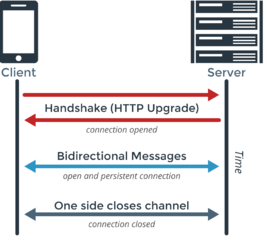Difference between revisions of "Client Server Model"
(→CRUD) |
(→CRUD) |
||
| Line 20: | Line 20: | ||
==CRUD== | ==CRUD== | ||
| − | Data must be stored, managed and represented | + | Data must be stored, managed and represented in the correct manner. Without the ability to manipulate your data, you essentially have a static data store that can never change. CRUD is an acronym to explain the main processes required: |
| − | *Create | + | *Create |
| − | *Retrieve | + | *Retrieve |
| − | *Update | + | *Update |
| − | *Delete | + | *Delete |
All are needed to have a complete and maintainable working database. SQL and Relational Databases conform to CRUD by using: | All are needed to have a complete and maintainable working database. SQL and Relational Databases conform to CRUD by using: | ||
Revision as of 15:47, 21 May 2017
Contents
Response & Request
API
An API or Application Program Interface is a set of routines enabling one program to interface with each other. The code defines how the programs work together.
Twitter has an API to allow other programs to use the service.
WebSockets Protocol
A set of rules to create persistent connection between 2 devices:
- Client sends handshaking request to establish connection
- In response server creates full duplex connection on a single socket
- Data transferred both directions
- Either side can close the connection
Message is the term given to packets of data sent using websockets, it creates a connection between the client and the server. The connection allows simultaneous exchange of data between the client and the server.
This is also routed via the HTTP port 80, so it will work in situations where other approaches or port numbers would be blocked by a firewall,
CRUD
Data must be stored, managed and represented in the correct manner. Without the ability to manipulate your data, you essentially have a static data store that can never change. CRUD is an acronym to explain the main processes required:
- Create
- Retrieve
- Update
- Delete
All are needed to have a complete and maintainable working database. SQL and Relational Databases conform to CRUD by using:
- Insert
- Select
- Update
- Delete
REST
JSON
XML
XML or Extensible Markup Language is a programming language used to define data types. The code uses tags represented as angled brackets <> and </> to signify the beginning and end of a segment of data of the type defined in the tags.
e.g.
<customers>
<customer>
<name> Daddy Wayne </name>
<address> 420 Wilson Grove </address>
</customer>
</customers>
This defines a parent data type <customers> containing one or more <customer> which contains <name> and <address>.
XML vs JSON
| JSON | XML | |
|---|---|---|
| Human Readable | It's easy to read because it's just defining objects and values. | Less readable because it's contained within markup tags |
| Compact Code | Less code than XML | More code than JSON |
| Speed of Parsing | Quicker, because it's defined as object and value | Slower, because the data has to be extracted from tags |
| Ease of Creation | Easier, because syntax is easier | More like programming so more knowledge is needed. |
| Flexibility & Extendibilty | Only works with limited data types, not enough for all applications | Gives total freedom, because you can create what data types there are, so it has greater flexibility |
